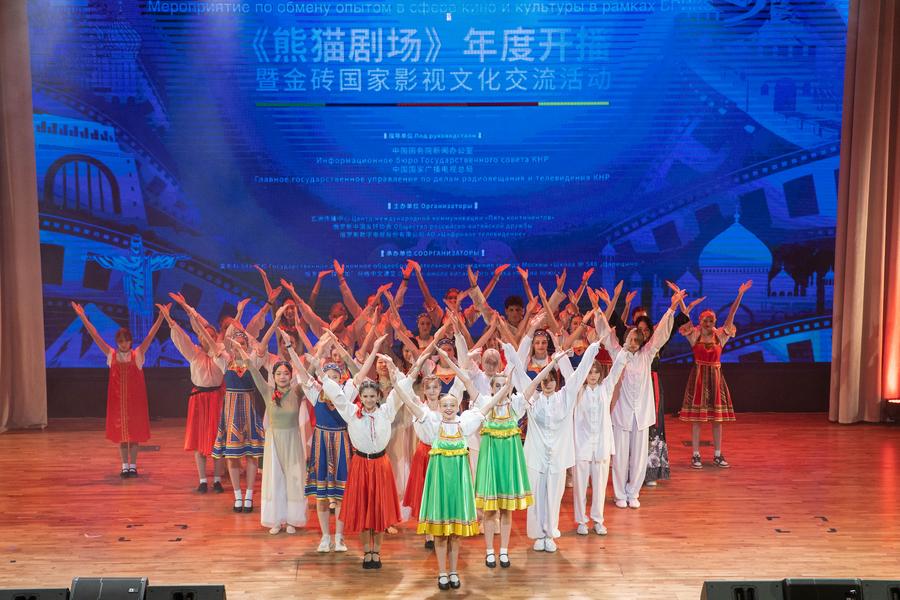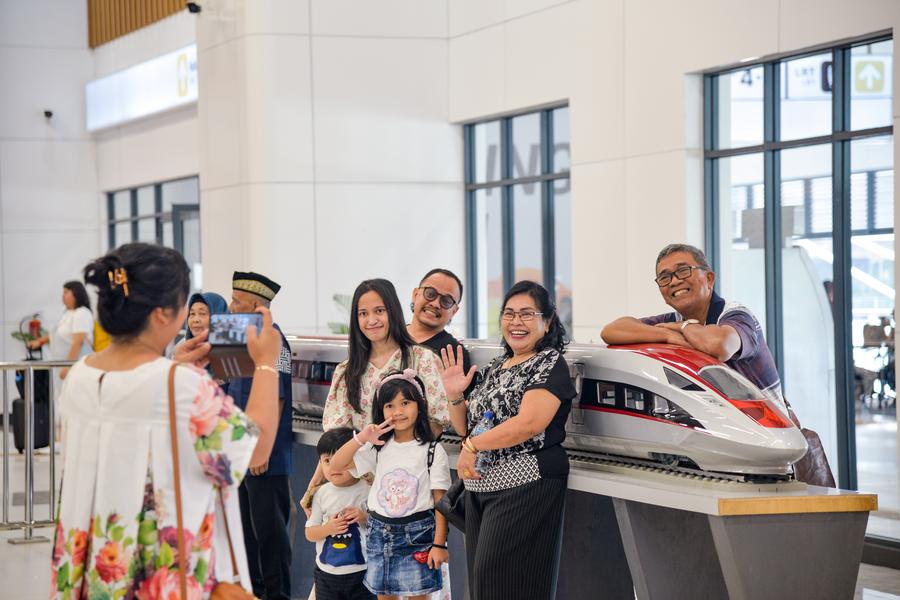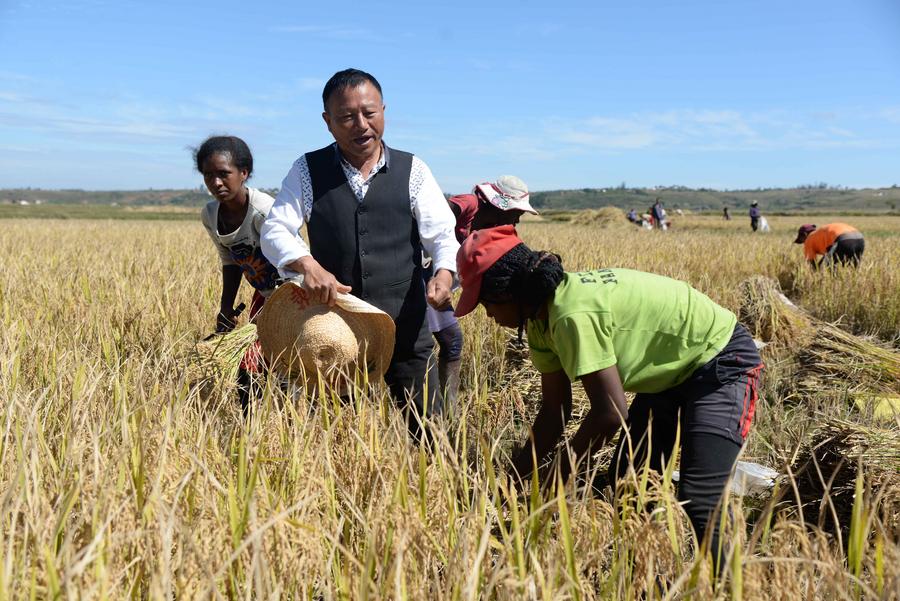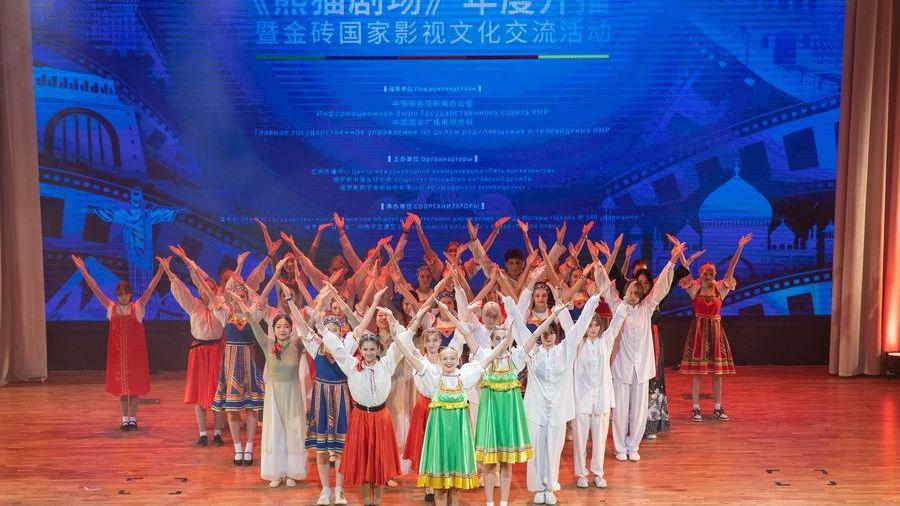Young Chinese and Russians perform on stage in Moscow, Russia, Sept. 22, 2024. (Xinhua/Bai Xueqi)
"More importantly, China is not only focused on its own development but is also directly contributing to the successful development of other countries and peoples," said Kulikova.
BEIJING, Oct. 4 (Xinhua) -- "I have been involved with China my entire life," said Galina Kulikova, first deputy chairperson of the Russia-China Friendship Association, who received the Friendship Medal, China's highest state honor.
Kulikova's lifelong involvement with China exemplifies the enduring bonds of friendship and cooperation between nations, especially as China continues to engage globally through initiatives like the Belt and Road Initiative (BRI).
TRADITIONAL FRIENDSHIP IN NEW ERA
Bilateral ties are enhanced at the grassroots level, where there is a growing interest in China among Russians, especially youths, Kulikova said.
"I must say that our Russia-China Friendship Association today primarily focuses on the regions because the public base of bilateral relations can only develop through the regions of Russia," she said.
"Our task is to work with the youth. The number of schools offering Chinese language education is growing. Interest in the Chinese language is growing," she said.
"Guys, you're young, the future of our relations is in your hands. Learn the Chinese language, study it, and you will always have work because our relations are developing," she told young students.
Kulikova studied at the Moscow State Institute of International Relations and then participated in the founding of the Soviet (Russia)-China Friendship Association in 1957, where she has been working for 62 years.
She has been invited to witness the military parade at Tian'anmen Square in central Beijing on Oct. 1, 2019. She also attended such celebrations on the 40th, 50th and 60th founding anniversaries of the PRC.
Having engaged in Russian-Chinese public diplomacy for over 65 years, Kulikova believes it is impossible to comprehend China without understanding Chinese modernization and how it is conducted.
Chinese modernization is one of the main directions in building socialism with Chinese characteristics, which encompasses not only economic principles but also spiritual development and nature, she said.
"More importantly, China is not only focused on its own development but is also directly contributing to the successful development of other countries and peoples," she added.
Passengers pose for photos with a model of a high-speed electrical multiple unit (EMU) train of the Jakarta-Bandung high-speed railway at the waiting hall of Halim Station in Jakarta, Indonesia, June 17, 2024. (Xinhua/Xu Qin)
ENHANCED CONNECTIVITY FOR DEVELOPMENT
Eva Chairunisa has a deep understanding of the contribution that Kulikova has just mentioned.
As general manager corporate secretary of Kereta Cepat Indonesia China, Chairunisa has witnessed the development of the Jakarta-Bandung High-Speed Railway (HSR).
With a design speed of 350 kilometers per hour, the 142.3-kilometer high-speed railway cut the journey between Jakarta and Bandung in West Java province from over three hours to around 40 minutes.
As of August, the Jakarta-Bandung HSR has transported 5 million passengers and provided services to 250,000 passengers from 157 countries and regions, Chairunisa told Xinhua.
"It is also worth mentioning that the operation of the Jakarta-Bandung HSR has not only added a new transportation infrastructure but also changed local lifestyles. People are now more willing to choose environmentally friendly and time-saving public transportation," said Chairunisa.
China's advancements have greatly benefited neighboring countries, bringing about social progress. This includes the bilateral cooperation between China and Indonesia, which involves not only government projects, not just in transportation but also in other fields, she said.
"More importantly, it has helped improve the level of human resources in Indonesia. Our workforce has learned much from the technology China has shared with us. For instance, we had no prior knowledge of HSR technology, but now we have learned and mastered it comprehensively," she added.
While China has made a miracle in its high-speed railway with total operating mileage surpassing 160,000 km, it has also stepped up efforts to help other Global South countries enhance connectivity.
The transport projects under the BRI could reduce travel times along economic corridors by 12 percent, increase trade between 2.7 percent and 9.7 percent, increase income by up to 3.4 percent and lift 7.6 million people from extreme poverty, according to an estimate by the World Bank.
Hu Yuefang (2nd L), a Chinese hybrid rice expert, works with local farmers in a field in Mahitsy, a town 35 km northwest of Antananarivo, Madagascar, on May 12, 2023. (Xinhua/Sitraka Rajaonarison)
UNITED FOR GLOBAL SOUTH MODERNIZATION
China's efforts to help the Global South to achieve modernization go beyond building infrastructure. Chinese hybrid rice, for example, has gradually helped Madagascar to eradicate hunger.
Madagascar, heavily reliant on rice imports due to low yields and outdated techniques, saw a transformation after China's Hunan Academy of Agricultural Sciences and Yuanshi Seeds Industry Hi-Tech Co. launched a hybrid rice project in 2007.
By December 2022, hybrid rice covered 75,000 hectares with yields of 7.5 tonnes per hectare in the African country, far exceeding local varieties.
Madagascar has benefited greatly from "fruitful" cooperation with China, said Madagascar's President Andry Rajoelina in an interview with Xinhua, noting that the BRI has brought significant opportunities for the African country to "integrate more deeply into global supply chains."
So far, China has provided assistance to over 160 countries, collaborated with more than 150 countries and over 30 international organizations under the BRI, and promoted cooperation on global development initiatives with over 100 countries and multiple international organizations, including the United Nations.
During the 2024 Summit of the Forum on China-Africa Cooperation held in Beijing in early September, leaders from the Global South wasted no time learning by paying visits to various regions in the Asian country.
South African President Cyril Ramaphosa visited Shenzhen to experience the technological innovation of Chinese enterprises; Zimbabwean President Emmerson Mnangagwa visited rural areas in Hunan Province for experience in agricultural modernization; Senegalese President Bassirou Diomaye Faye visited Shandong Province for experience in agricultural technology and machinery, among other areas.
China's modernization and rejuvenation will benefit the developing countries of the Global South in their quest for development, said Maged Monir, editor-in-chief of Egypt's Al-Ahram newspaper, the country's top daily.
"One of the most important characteristics of China's relations with the countries of the Global South or the developing world is that China seeks cooperation in development without interference in the internal affairs of other countries," Monir said.







 A single purchase
A single purchase









